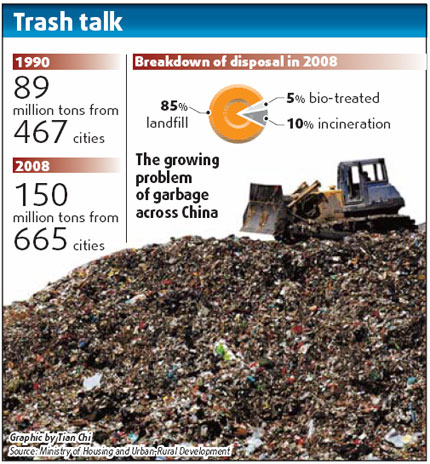
The problem was further compounded by the incinerator, which has a 50-m-tall stack. Locals said the odor hit its peak during the Olympic Games last summer, when the plant was accepting an average of 4,700 tons a day.
"I had to wear a mask to watch the Games on television at home," said Zhao Lei, 35, who lives in Changying, just 3.5 km from the 40-hectare site. "When I was watching the closing ceremony, I suddenly couldn't breathe and was sent to hospital where they said I had a lung infection from breathing in toxic gas."
Zhao was among an estimated 1,000 protesters who took to the streets last August demanding the plant be cleaned up, forcing an apology from Chaoyang district authorities and a promise the smell would be dealt with.
Many environmentalists share her fears about the use of incineration technology, citing the fact such waste plants often release significant amounts of heavy metals and dioxins.
Doxins are a group of dangerous chemicals known as persistent organic pollutants with highly toxic potential. In 1990, experts from the World Health Organization evaluated the effects of long-term exposure to dioxins and linked it to impairment of the immune system, nervous system and endocrine system, as well as reproductive functions.
Chronic exposure of laboratory animals to dioxins resulted in several types of cancer.
In 2006, the municipal government unveiled plants to invest 800 million yuan in building a waste-fueled plant on the Liulitun landfill site in Beijing's western Haidian district in time for the Olympic Games, but it was put on hold the following year after a protest outside the gates of the Ministry of Environmental Protection.
Built in 1999, Liulitun was accused of using an improper disposal method and being poorly managed, leading to pollution. Meanwhile, studies showed that, between 2000 and 2006, a nearby apartment block with around 1,000 residents had 70 reported cases of cancer - five times the per capita average - with 46 of them fatal.
Professor Nie dismissed concerns over pollution at a public hearing for the Liulitun plans. He said: "As long as garbage is burned at between 360 and 850 centigrade, hazardous emissions, including dioxins, are burnt up within two seconds."
Zhao Zhangyuan, 66, a retired expert formerly with the State Environmental Protection Administration, however, warned governments not to be too hasty in placing their trust in the advancing technology.
"It has only tested safe in your laboratory. How can we ensure its safety in practical management in China?" asked Zhao, who after inspecting all 50 plants across China has become a harsh critic of incineration plants. "Most incinerators in China lack proper management due to cutting cost. The garbage is often not burned completely, so emissions of dioxins are inevitable.
"The half-life of dioxin elimination is 14 to 273 years, so the accumulation effect is ultimately harmful to human beings. Since cancer cases were found to be increased among residents living near incinerators, Japan has closed two-thirds of its incinerators in recent years and many European countries have also banned incineration."
Wang Xiaojun, communications director for Greenpeace China, added: "Incineration will inevitably cause pollution, so we oppose plans for more plants in Beijing. We insist on 'reduce, recycle and reuse'. That is the ultimate way.
"The government should legislate and supervise producers to reduce the usage of potential contaminants and recycle their own products, while citizens should also learn how to reduce the amount of garbage the produce in their daily life."
Zuo Lanping, vice director of the Fengtai district administration commission, oversees the handling of 2,500 tons of household trash produced by 1.7 million people every day. She supports installing incinerators but admits the garbage crisis will not disappear in a puff of smoke.
"Usually, the government builds a landfill and then transfers operations to private contractors. But some firms only want to maximize their profits and lack supervision, leading to a series of problems," she said. "The public has lost patience. The government should handle the situation with transparency and keep educating citizens on environmental protection."
Separating waste at the source is key to solving the crisis, she explained, adding that the current truck-based collection system was ineffective.
"In China, recyclable solid waste such as paper, cans and bottles are picked out by the many mobile garbage pickers, but the rest of the waste could be hazardous without proper treatment," she said. "Kitchen waste, such as food scraps, can't be burned, but most people wrap them up with solid garbage before they throw it out. A system of separating the different kinds of trash while in transit should be developed."
Fengtai district has invested more than 1 billion yuan in a new compound garbage center, including a waste separation factory, incinerator and kitchen waste disposal, she added.
(China Daily July 28, 2009)